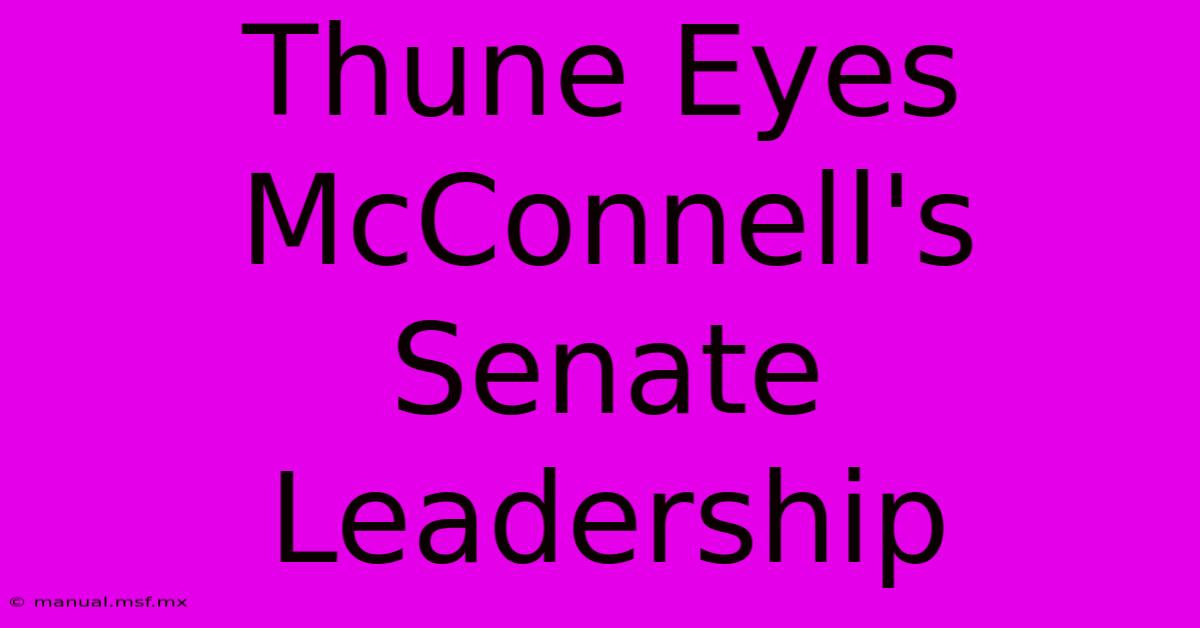Thune Eyes McConnell's Senate Leadership

Discover more detailed and exciting information on our website. Click the link below to start your adventure: Visit Best Website. Don't miss out!
Table of Contents
Thune Eyes McConnell's Senate Leadership: A Power Shift Brewing?
Is a challenge to Mitch McConnell's Senate leadership brewing? With Senator John Thune, a seasoned Republican and McConnell's ally, seemingly testing the waters, the possibility of a leadership change in the Senate is a topic on everyone's lips. This article dives into the potential shift in power and its implications.
Editor Note: Senator John Thune has publicly expressed his support for McConnell's continued leadership but acknowledged the ongoing discussions regarding the future of the Senate Republican leadership. This article aims to analyze the potential challenges and the reasons why this topic has captured the attention of political observers.
This development has significant implications for the Republican Party and the future direction of the Senate. Understanding the potential shift in power, the motivations behind it, and its potential consequences is crucial for anyone following American politics.
Analysis: This article delves into the evolving dynamics within the Senate Republican caucus, exploring the motivations behind the potential leadership change, the potential consequences for both the party and the Senate, and the key players involved.
Key Takeaways of Senator Thune's Comments:
| Aspect | Detail |
|---|---|
| Public Statement | Expresses support for McConnell, yet acknowledges discussions about leadership changes. |
| Potential Challenge | Could be interpreted as testing the waters for a future leadership bid. |
| Motivations | Potential frustration with McConnell's strategy, desire for fresh leadership. |
| Implications for the Republican Party | Potential for a more moderate or aggressive approach depending on the new leader. |
Thune Eyes McConnell's Senate Leadership: A Shifting Power Dynamic
Public Statement: Senator Thune's recent comments, while expressing support for McConnell, have sparked speculation about a possible leadership challenge. He has stated his belief that McConnell is "the best person for the job," while simultaneously acknowledging that "there are always conversations about leadership."
Motivations: The potential motivations behind this perceived shift in power dynamics could be several. Some believe Thune might be positioning himself for a future leadership role, perhaps capitalizing on dissatisfaction within the Republican caucus regarding McConnell's strategy. Others suggest that Thune's comments may be aimed at influencing McConnell's approach to leadership, pushing for a more aggressive strategy in the face of potential Democratic control of the Senate.
Consequences: The consequences of a leadership change in the Senate could be far-reaching. It could influence the Republican Party's direction, potentially leading to a more moderate or aggressive stance depending on the new leader's priorities. This, in turn, could impact policy decisions, the effectiveness of legislative maneuvering, and the overall balance of power in the Senate.
Key Players: The potential leadership shift involves a handful of key players, including McConnell himself, Senator Thune, and other influential members of the Republican caucus. Their individual motivations and alliances will play a significant role in shaping the future of Senate leadership.
Thune's Potential Challenge: Examining the Possibilities
Possible Scenarios: The potential for a leadership challenge raises various possibilities. A direct challenge could lead to a formal vote within the caucus, with the outcome potentially altering the power dynamic within the Senate. Alternatively, Thune's comments could be a strategic maneuver designed to influence McConnell's approach without explicitly challenging his leadership.
Factors at Play: The likelihood of a leadership change will depend on several factors, including the Republican Party's performance in the upcoming elections, the extent of dissatisfaction within the caucus, and the ability of potential challengers to garner sufficient support.
Consequences for the Senate: A change in leadership could impact the Senate's ability to function effectively. A new leader may bring fresh perspectives, potentially leading to new alliances and strategic approaches. However, it could also cause instability and disrupt the established order within the Senate.
The Future of Senate Leadership: Uncertainties and Possibilities
Conclusion: The potential shift in power dynamics within the Senate Republican caucus is a complex and multifaceted issue. Thune's comments, while seemingly innocuous, have triggered speculation and debate about the future of Senate leadership. The outcome of this situation remains uncertain, but it highlights the ongoing power struggles and potential shifts within the Republican Party and the Senate.
Closing Message: The evolving dynamics within the Senate Republican caucus reflect the shifting political landscape and the inherent power struggles within any political institution. The upcoming months will be crucial in determining the future of Senate leadership, with the implications potentially extending far beyond the halls of Congress.

Thank you for visiting our website wich cover about Thune Eyes McConnell's Senate Leadership. We hope the information provided has been useful to you. Feel free to contact us if you have any questions or need further assistance. See you next time and dont miss to bookmark.
Also read the following articles
| Article Title | Date |
|---|---|
| Renard Returns Saudi Arabias Coach Is Back | Nov 14, 2024 |
| Sco Probes Winnipeg Surgery Nightmarish Mistake | Nov 14, 2024 |
| Cara Cek Bansos Lewat Nik Ktp Di Cekbansos Kemensos Go Id | Nov 14, 2024 |
| Cornyn Loses Bid For Senate Leadership | Nov 14, 2024 |
| Wembanyama Career High 50 Points Team Wins | Nov 14, 2024 |
| Liga Svww Pleite In Saarbruecken | Nov 14, 2024 |
| Holstein Kiel Rapp Spricht Klartext | Nov 14, 2024 |
| Wm Quali Asien Liveticker Australien Gegen Saudi Arabien | Nov 14, 2024 |
| Centrelink Relief 1100 Payment | Nov 14, 2024 |
| Reggio Emilia Denunciato Sedicenne Per Aggressione Al Medico | Nov 14, 2024 |
